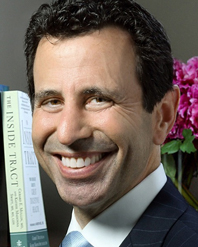The Gut Balance Revolution

Advice from Dr. Gerard Mullin on How to Lose Weight for Good.
More than two thirds of adults in the United States are overweight or obese. Why? The conventional explanation is too much food and too little exercise, but new thinking about the causes of overweight and obesity suggests that something else is at work.
In his new book The Gut Balance Revolution, Gerard Mullin, M.D., associate professor of medicine at Johns Hopkins University School of Medicine, looks at research that is revolutionizing scientific understanding of why people gain weight and tells you how to lose weight by rebalancing the microbes in your digestive system. He spoke with Paula Dranov.
Weight is a national preoccupation and losing weight and keeping it off is difficult and frustrating. How does your approach differ from all the others out there?
First let me tell you what I DON’T do: focus on weight loss. The vast majority of overweight patients I see have imbalances in diet, lifestyles and in their gut ecosystems. So applying a functional medicine-whole body systems approach I try to restore harmony and balance to the gut. How? I first remove dietary and lifestyle factors that adversely influence the health of the body and in particular the gut microbiome, which is our second brain.
You write that the concept of “calories in/calories out” is outdated and that there are other important influences on weight. What are the others?
The laws of thermodynamics indicate that you are – energetically – what you eat. The truth is you are what you absorb, as the gut is the ultimate authority of how your food is metabolized. For example, if you eat an apple but your gut flora are unhealthy, they can become more efficient at fermenting fiber in that apple and EXTRACTING more calories from of that apple. There are 2 main phyla of gut bacteria, Firmicutes and Bacteroidetes. The Firmicutes, F=fat forming bacteria, are very efficient fermenters of fiber. They are overrepresented in the gut microbiome of people who are overweight and obese and extract MORE calories out of food. Scientists believe that this alone can account for 150 calories per day, which over a 24-day period will cause 1 pound of weight gain and over a year, 15 pounds without even eating a single bite more. The concept of the “gut driving the bus” in health and illness, appears new and cutting edge but has long been practiced by Ayurvedic healers, in traditional Chinese Medicine (TCM), and for decades naturopathy and functional medicine in the West. Science has now confirmed these traditional practices: “when in doubt heal the gut”.
You mention that you lost a lot of weight in 1979, way before most of us had any clue that anything beyond calories was responsible for excess weight. How much did your diet then resemble what you now advise?
It was very similar. I began eating a lot of fibrous foods and yogurt and cutting out starchy and processed foods, breads, pasta and ate oatmeal/oat bran, eggs, loads of protein. I also increased my physical activity. My oldest brother Patrick prompted me to become a karate student, which sparked my interest in the Asian arts and medicine. It also taught me discipline.
You write that the health of our microbiome is influenced the antibiotics we’ve taken. How has this happened?
Antibiotics are weapons of mass destruction for the gut and our modern plague. They dramatically reduce the biodiversity of the gut microbiome, and it takes months for the gut to rebound. Like many other diseases, obesity is characterized by a reduced biodiversity of the gut microbiome. The antibiotic story is quite interesting. In the 1940’s the cattle industry discovered that giving antibiotics to prevent diseases made the livestock grow nice and fat very fast. The problem is that the use of so many antibiotics for livestock (this now adds up to 80 percent of all antibiotics used in the U.S.) is creating drug shortages for humans as well as antibiotic resistant superbugs that make it difficult to treat deadly infections. More troubling is scientific evidence showing that the over prescription of antibiotics for children portends obesity and other diseases later in life. And then there’s this fact: we know that antibiotics make livestock fat. Why not humans?
Why do we need to include fermented foods in our diet? When is it best to eat them?
Fermented foods such as sauerkraut, kimchi, yogurt and miso are key to restoring good gut flora and turning your gut into a fat burning machine. Eat these foods during the day, the earlier the better. There is a gut clock, and our body’s motility system generates cleansing waves to clear out debris and bacteria from our delicate upper digestive systems to maintain a healthy lining and immunity. To make sure this process takes place avoid eating within four to five hours of sleep. Otherwise, your gut becomes polluted like a pond without proper flow.
The Gut Balance diet starts out high in protein. How does it differ from other high protein diets?
The high protein ketogenic diet induces a lean metabolism during the metamorphosis of the gut microbiome away from fat forming to a fat burning biodiverse ecosystem. What differentiates this diet is that the proteins are lean, highlight foods like pasture and organic eggs, whey protein, wild fish, lean poultry. The diet restricts protein sources that are inflammatory such as red meat.
Scientific thinking about eggs and cholesterol has changed. You call eggs a “super protein” and recommend eating them for breakfast or lunch. Is there any limit to the number of eggs you can eat weekly on the Gut Balance diet?
On average, two eggs a day are fine. With more than that the gut flora can metabolize phosphatidylcholine, a component of egg yolks to TMAO (trimethylamine-N-oxide), a metabolite that promotes cardiovascular disease.
Gerard E. Mullin MD, board-certified internist, gastroenterologist, nutritionist, Huffington Post columnist and author of The Gut Balance Revolution. Find Dr. Mullin on Facebook and Twitter.









